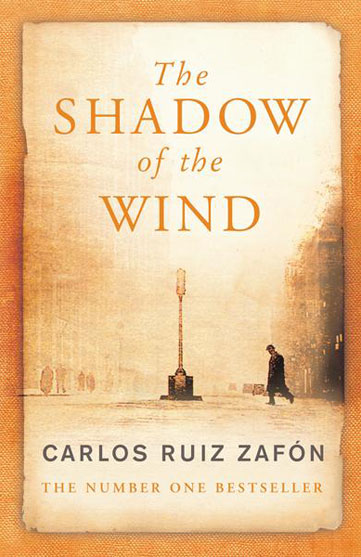
Book Review: The Shadow of the Wind by Carlos Ruis Zafon
The Shadow of the Wind by Carlos Ruis Zafon is a substantial novel, weighing in at over 500 pages. It’s so vast that it seems desultory to attempt to describe it in a review, yet that is exactly what I am going to do here.
Hidden deep within the old city in Barcelona is a library of obscure and forgotten titles- the “cemetery of lost books”. His father brings ten- year- old Daniel there one chilly morning in 1945. Daniel is allowed to choose one book and pulls out The Shadow of the Wind by Julian Carax. Over the next few decades, he realises several people are interested in his find, leading him to go on an adventure, one that unravels the mystery of the author and highlights another man’s tragedy. The novel has been a publishing phenomenon- it has been sold in twenty countries and translated into several languages.
Some reviewers have commented that The Shadow of the Wind is everything you would want a proper novel to be, featuring an enthralling tale that absorbs the reader. I agree with this idea, as the plot of the book uncurls over those 500 pages, revealing hidden corners and exposing nuggets of information secreted within the words of the text. The plot is so complex that trying to summarise it is difficult. It is primarily a book about a book and is a fantastic mixture of love, obsession, revenge, friendship and tragedy.
The language of The Shadow of the Wind can be quite difficult to penetrate at first, due to its verbose and flowery descriptions, which I imagine comes from the fact that the text has been translated into English from its original Spanish. The prose slowed my reading down slightly, which could be difficult for readers who like to devour novels. Expect this one to be a slow- burner. At some points, I wanted to yell at the author “Carlos honey, get an editor”. However, the book’s prose serves as Ruiz’s love letter to language.
Daniel narrates the character in first- person and I found him engaging, although not always likeable. I adored his friendship with Fermin, the street urchin and former Republican agent. Fermin is defined by his loose appetites and comical astuteness, as well as a steadfast loyalty. He is an interesting study in how people can differ from what we perceive them to be at first. The novel is peopled by a cast of diverse characters, from the seemingly angelic Clara to the villainous Fumero.
Yet, the star of the tale was, for me, the city of Barcelona itself. It is a beautiful and romantic setting, unique in its history and tangled web of streets. Ruiz uses the city as the backdrop for his novel in a manner comparable to how Dickens sets his literature against the background of London (or Victor Hugo effectively utilises Paris) and it is an effective and memorable ploy. Ruiz deftly paints a world of corner cafes and elegant architecture. Barcelona lingers in the reader’s mind long after the novel has finished.
The Shadow of the Wind may have a slow start, but it is well worth staying with, as underneath its heavy layers lies a seductive and thrilling tale.

Discover more from Sweet Harmless Temptations
Subscribe to get the latest posts sent to your email.


